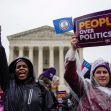The U.S. Supreme Court recently upheld a lower court decision prohibiting race-based gerrymandering. In a surprise 5-4 decision, the Court narrowly avoided a complete gutting of the 1965 Voting Rights Act.
Two of the Court’s conservative members, Chief Justice John Roberts and Justice Brett Kavanaugh, joined the liberal-leaning justices to rule that the voting map used in Alabama’s 2022 congressional elections violated the Voting Rights Act. The Court found that the state’s Republican-held state legislature had denied African American voters a reasonable chance to elect representatives of their choice.
The case concerned Alabama’s congressional redistricting plan. The Republican-held legislature drew voting districts that packed the lion’s share of the state’s Black voters into a single congressional district while spreading the remainder thinly across the other six districts. Although roughly a quarter of Alabamians are Black, the gerrymandered map effectively prevented those voters as a bloc from acquiring a second congressional seat or winning statewide elections.
The Supreme Court agreed with and upheld the lower court’s ruling, which found that “Alabama's extensive history of repugnant racial and voting-related discrimination is undeniable and well documented,” and that “Black Alabamians enjoy virtually zero success in statewide elections.” Writing for the majority, Justice Roberts stated the Court saw no “reason to disturb the District Court’s careful factual findings, which are subject to clear error review and have gone unchallenged by Alabama in any event.”
The decision came as a surprise to many Supreme Court watchers. The Court is currently held by a firm, 6-3 conservative majority who have shown little compunction toward cutting back on voting rights. Even Justice Roberts, considered the most “moderate” of the Court’s conservative wing, has authored or joined a number of other decisions whittling down key provisions of the VRA. Voting rights advocates worried that the instant case could deliver the final blow to the VRA, upending decades of settled law.
Justice Clarence Thomas wrote a scathing, nearly 50-page dissent to the decision. He argued that the VRA does not require Alabama to “intentionally redraw its longstanding congressional districts so that black voters can control a number of seats roughly proportional to the black share of the State's population.” If the law did so require, according to Thomas, “the Constitution would not permit it.”
The conservative firebrand went further, contending that the sole power of the Voting Rights Act is to regulate voters’ ability to actually get to the ballot box and vote. In his view, the VRA has no power whatsoever to prevent state legislators from drawing the voting maps however they see fit, whether that clearly involves racial gerrymandering or otherwise.
Biden administration officials, on the other hand, lauded the ruling. Attorney General Merrick Garland asserted that the “decision rejects efforts to further erode fundamental voting rights protections, and preserves the principle that in the United States, all eligible voters must be able to exercise their constitutional right to vote free from discrimination based on their race.”
The decision will have an immediate and profound effect on Voting Rights Act challenges to redistricting efforts in other states. Voting rights advocates believe the ruling will spur forward litigation challenging Louisiana’s congressional map, for example. Last year, the Court temporarily halted a district court’s ruling that the state’s map must be scrapped based on clear racial gerrymandering. Armed with the Court’s most recent decision, however, the Louisiana voters may yet prevail in the case at large.






